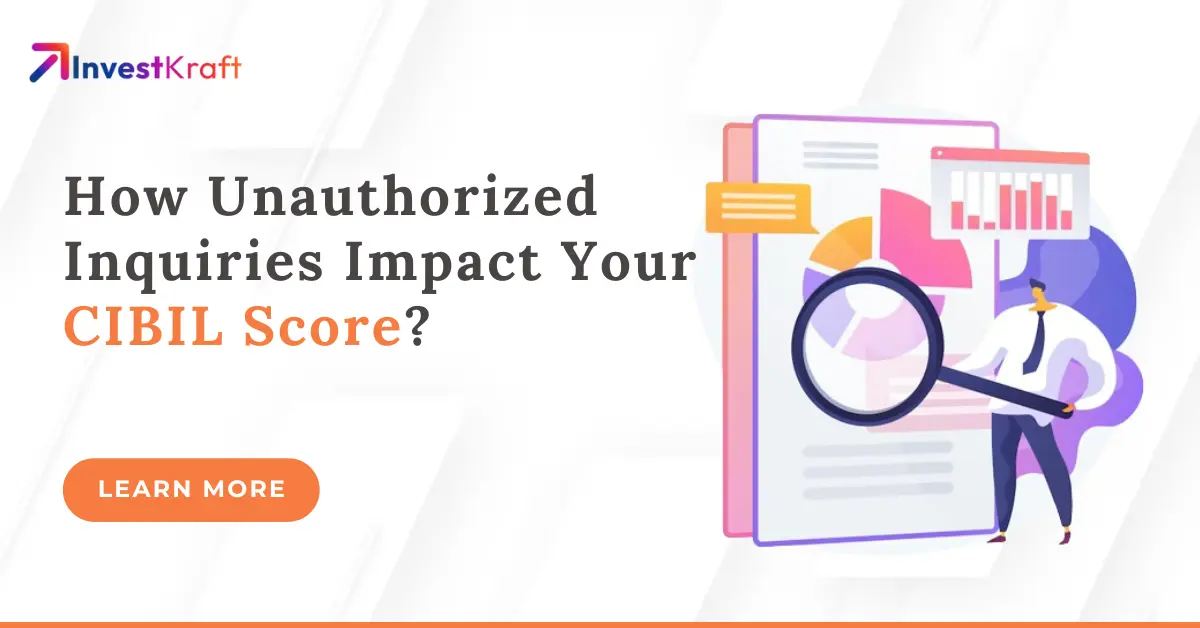CIBIL Score Alert: Steps to Fix Unauthorized Inquiries on Your Credit Report

If you find a credit enquiry from a bank/financial institution that you do not recognize on your CIBIL report, it could mean that someone used your information to apply for a personal loan or credit card. This could also happen if you obtained a loan/credit card through a third-party marketplace that collaborates with banks or financial institutions or opted for a buy now pay later option. In such cases, you may need to investigate which entity provided the credit and the bank they partnered with.
If you are concerned about potential identity theft or suspicious activity, it is important to take action. Contact your bank or financial institution to investigate the situation and consider filing a complaint with CIBIL to address any inaccuracies on your credit report. Taking these steps can help protect your financial security.
According to the Credit Information Companies (Regulation) Act of 2005, credit bureaus such as CIBIL are only authorized to modify the information on your CIBIL report with verification from the relevant bank or financial institution.
This blog will provide an overview of the necessary steps to investigate fraud and offer tips to help you recognize and address identity protection issues early.
The Silent Threat of Unauthorized Inquiries on Your CIBIL Score
Unauthorized enquiries into your credit report are a lesser-known threat in India that can have a significant impact on your financial life. These inquiries can occur without your knowledge or consent and can harm your credit score, making it more difficult to obtain loans and other financial opportunities. It is important to regularly monitor your credit report and report any unauthorized inquiries to protect your creditworthiness.
What are Unauthorized Inquiries?
Unauthorized enquiries on your credit report can happen when someone accesses your credit report without your consent. This can happen due to identity theft or fraud and it is important to monitor your credit report regularly to catch any unauthorized activity. If you notice unauthorized enquiries, you should take immediate steps to protect your identity and credit information.
- Identity theft: It is a serious concern because it can result in someone using your personal information to open credit accounts and make purchases in your name. It is important to take steps to protect your personal information and monitor your credit regularly to detect any unauthorized activity. Be cautious about sharing personal information online and consider using identity theft protection services for added security
- Errors by lenders or credit bureaus: Lenders or credit bureaus may make errors and inadvertently check your credit report without your knowledge even if you have not initiated any credit applications
- Suspicious activity: If your accounts show any signs of suspicious activity, lenders or credit bureaus may contact you to investigate the situation more thoroughly. This could involve verifying recent transactions or updating your security information to prevent unauthorized access. It is important to stay vigilant and respond promptly to any inquiries related to suspicious activity on your accounts
Why are Unauthorized Inquiries a Threat?
Multiple unauthorized inquiries can have a significant impact on your CIBIL score, unlike a single inquiry. It is crucial to understand why -
- Increased credit risk: Having numerous credit inquiries on your report can make lenders think you are seeking a lot of credit, potentially indicating financial strain and elevating your risk level. This heightened perception of risk might impact your ability to secure new credit or result in higher interest rates
- Reduced score: Credit scoring models take into account the number of inquiries made. Excessive inquiries, including unauthorized ones, can negatively impact your credit score
Do All Types of Enquiries Impact Credit Scores?
When applying for credit, it is important to distinguish between hard and soft credit enquiries and how they affect or impact your credit scores.
- Hard credit inquiries, or hard pulls or checks, occur when you seek new credit or embark on significant financial commitments. When you apply for a credit card, the issuer will review your credit file, resulting in a hard inquiry. It is important to note that you must consent for a company to conduct a hard pull on your credit. Therefore, these inquiries should not come as a surprise.
- Soft credit inquiries, also called soft pulls or checks, are conducted by companies to assess your creditworthiness for purposes unrelated to obtaining new credit. These enquiries are frequently used for background checks or to ascertain credit preapproval eligibility. While some, like employer credit checks, require your consent, others can be performed without your permission or your awareness.
Things You Must Do If You Suspect Unauthorized Inquiries on Your Credit Report
By following these steps, you can safeguard your credit profile and minimize any potential harm caused by unauthorized inquiries on your credit report -
- To review your credit report, obtain a copy from CIBIL and thoroughly examine it for any unfamiliar inquiries or accounts
- Consider freezing your credit report to prevent unauthorized inquiries or activity. This will protect your credit profile from potential fraud
- Regularly monitoring your credit report is crucial. Stay vigilant for signs of suspicious activity and take advantage of credit bureaus’ monitoring services or alerts. They can promptly notify you of any changes to your credit report and help you address any potential fraud or identity theft
- If you suspect identity theft, report it immediately to the authorities. This involves contacting the police and alerting the relevant financial institutions about the fraud
- Additionally, it is important to contact the credit bureau to request the removal of any unauthorized inquiries from your credit report. It is advisable to maintain thorough records of all correspondences and documents related to the dispute process
How to Start a Dispute Regarding Unauthorized Inquiries on Your Credit Report?
You cannot remove the inquiry from your report if you have applied for new credit and initiated a hard credit pull. However, if a credit inquiry is due to fraud or error, you can dispute it with the credit bureaus to request its removal.
How to File a Dispute with CIBIL to Remove Credit Inquiries?
Just follow the simple steps given below to file a dispute with CIBIL to remove fraudulent or erroneous credit inquiries -
- Step 1 - If you are a CIBIL account holder, simply login to your CIBIL dashboard. Alternatively, if you have obtained your CIBIL report from a partner or financial institution, you can sign up for a free annual credit
- Step 2 - Login to your account before starting a dispute to ensure that you have the most updated Credit Score and Credit Report. This will help minimize any incorrect disputes by referring to the latest information
- Step 3 - Complete the dispute request form by raising multiple requests simultaneously
- Step 4 - Await the response from banks/financial institutions. The officials will diligently follow up with the reporting landers, but please note it may take up to 30 days for typical processing
What to Expect During Credit Report Dispute Resolution with CIBIL?
1. Review and Refresh Your CIBIL Score
- Access your credit report by logging into your CIBIL account
- Refresh your score to have the latest information and minimize the possibility of disputing a previously corrected error
2. Identify and Dispute Errors (if any)
- Make sure to thoroughly review your credit report for any errors or inconsistencies, such as inaccurate account details, unjustified late payment records or unfamiliar accounts
3. File an Online Dispute
- You can access the “Dispute Center” section in your CIBIL account to address any errors you encounter. In this section, an online dispute form is available for you to fill out
4. Complete the Dispute Form Accurately
- Fill out the form thoroughly and precisely. This includes:
- Specify the section of the report where the error is located, such as account details or payment history
- Clearly and concisely describe the error
- Including scanned copies of supporting documents, such as bank statements or payment receipts, will provide stronger evidence to support your claim and prove the error
5. Dispute Status: "Under Investigation"
- After you submit the dispute, the fields in your report that are being disputed will be labelled as “Under Dispute”. This indicates that the dispute has been started and is currently being assessed
6. CIBIL Investigates
- CIBIL will look into the details of your dispute and determine the specific bank or financial institution that furnished the disputed information
7. Bank/Financial Institution Involvement
- CIBIL takes the necessary steps to investigate any discrepancies in credit reports by reaching out to the relevant bank or financial institution for clarification. This helps resolve any potential errors or issues in the credit report and ensures the accuracy of the credit information available to lenders and individuals
8. Dispute Resolution
- The bank/financial institution will then review the information and make a decision:
- Dispute Accepted: Once the bank accepts your dispute, they will make the necessary changes to the information and inform you about the update
- Dispute Rejected: The bank will notify you if they disagree with your claim and reject the dispute
9. Dispute Outcome
- Dispute Accepted: Your report will be updated to remove the “Under Dispute” status and the corrected information will be reflected in the relevant section
- Dispute Rejected: Your request to dispute the information on your credit report has been rejected. As a result, the “Under Dispute” status will be removed, but the original information will still be included in your report
Conclusion
It is important to be vigilant about any unauthorized inquiries on your CIBIL report as they can have a major impact on your financial health. This article guided how to identify and address these inquiries proactively. It emphasizes the significance of regularly monitoring your CIBIL report and acting swiftly to protect your credit identity.
Early detection and rectification are essential for safeguarding your credit score and financial security. Taking proactive steps to protect yourself from identity theft is crucial in ensuring your credit health. Stay vigilant and take control of your financial well-being to avoid falling victim to fraudulent activities.
Frequently Asked Questions (FAQs)
Q: What is an unauthorized inquiry on my CIBIL report?
A: An unauthorized inquiry is a red flag on your CIBIL report, indicating that a financial institution has accessed your creditworthiness without your knowledge or consent. This usually happens when you have not recently applied for a loan or credit card
Q: Why should I be concerned about unauthorized inquiries?
A: Unauthorized inquiries could indicate attempted identity theft, leading to potential financial damage such as a lower credit score and the burden of dealing with fraudulent accounts. It is important to monitor your credit report and look out for any suspicious activity, as multiple inquiries in a short timeframe can hurt your credit score
Q: What steps should I take if I find unauthorized inquiries?
A: Here's what to do if you suspect unauthorized inquiries:
- Report any discrepancies in your credit card to CIBIL, the credit bureau responsible for generating the report. They have an online dispute resolution process that allows you to highlight any unauthorized inquiries
- To effectively dispute unfamiliar inquiries, it is essential to gather key information. Make sure to carefully note down the dates and the entities responsible for the inquiries that you do not recognize. This information will play a critical role in the disputing process
- Regularly reviewing your report is important as it allows you to catch any suspicious activity early. Most credit bureaus provide credit monitoring services that can alert you of any changes. Monitoring your CIBIL report frequently, whether through free or paid services, is a crucial step in safeguarding your financial information
Q: How can I dispute unauthorized inquiries with CIBIL?
A: CIBIL's website offers a dispute resolution mechanism where users can initiate the process by logging in, accessing their credit report, and selecting the "Dispute Center" option. Users must provide details of unauthorized inquiries and submit any relevant supporting documentation.
Q: What happens after I dispute an unauthorized inquiry?
A: CIBIL will investigate your claim and reach out to the entity responsible for the inquiry. The process might be time-consuming, so please exercise patience. If the inquiry is proven to be unauthorized, CIBIL will eliminate it from your report and inform you of the outcome.
Q: Will disputing an inquiry affect my credit score?
A: Disputing an inquiry is an important step to safeguard your credit health, as it can prevent any potential negative impact. By addressing unauthorized inquiries, you can ensure that your credit score remains unaffected. It's important to take action to protect your credit standing should you notice any unauthorized inquiries.
Q: How long does it take to remove an unauthorized inquiry?
A: The duration for removing unauthorized inquiries can vary based on various factors. CIBIL will investigate the claim and contact the entity responsible for the inquiry. This process may take more than 30 days.
Q: What if the inquiry remains after I dispute it?
A: If CIBIL's investigation confirms the inquiry's legitimacy, you are entitled to obtain a copy of the inquiry details from them to assess whether it was truly unauthorized. Additionally, reaching out to the inquiring entity directly can provide clarity on why the inquiry is reflected in your report.
Q: Can inquiries from legitimate lenders still be unauthorized?
A: Yes, unauthorized inquiries can come from seemingly legitimate lenders, when someone fraudulently uses your information to apply for a loan pre-approval or credit limit increase without your knowledge
Q: How can I differentiate between a legitimate and unauthorized inquiry?
A: Look for any recent loan or credit card inquiries you initiated to spot any unauthorized ones. Keep an eye out for inquiries made close together from multiple lenders you have not contacted, as this could be a red flag for potential unauthorized activity
Q: Is there a cost involved in disputing unauthorized inquiries?
A: Keep in mind that CIBIL provides a free dispute resolution service for addressing credit report inaccuracies. However, remember to also consider any charges that may come with accessing your CIBIL report

Author: Abhik Das
Abhik Das is a versatile content writer with over 5 years of experience crafting engaging and informative content across diverse industries. His expertise spans the fields of ed-tech, pharmaceuticals, organic food, travel, sports, and finance.
Here's what sets Abhik apart:
Content Versatility: Able to adapt writing style and tone to suit various audiences and content needs.
SEO Proficiency: Creates content optimized for search engines, ensuring discoverability and organic traffic.
Deep Research: Conducts thorough research to ensure content accuracy and credibility across complex topics.
Engaging Storytelling: Captures reader interest with clear, concise, and compelling writing.
Abhik's diverse background empowers him to deliver insightful content across a wide range of subjects. Whether you're seeking engaging explainer pieces on the latest financial trends, informative guides to organic food choices, or captivating travelogues, Abhik has the expertise to craft content that resonates with your audience.





















